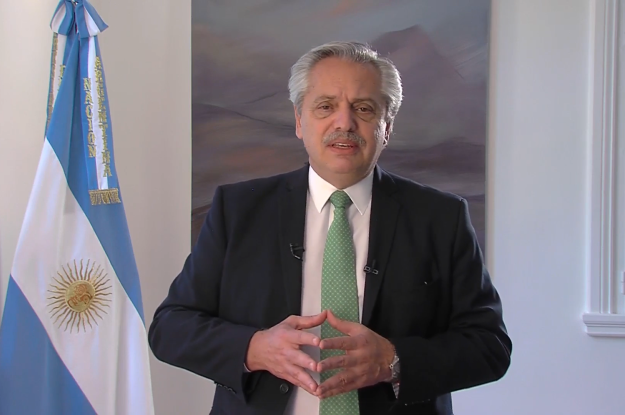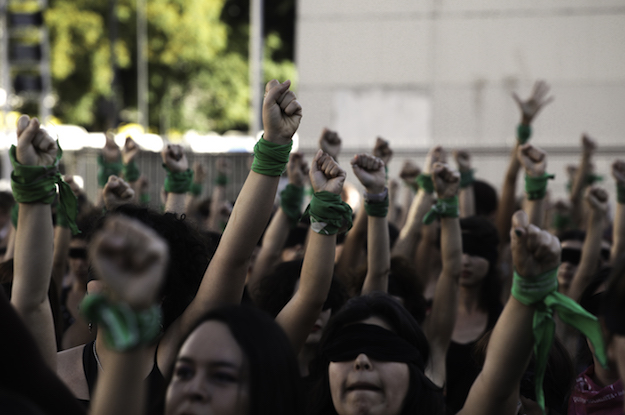BUENOS AIRES – Argentine reproductive rights activists are hoping for a “green” Christmas this year after President Alberto Fernández re-launched the country’s debate over legal abortion on November 17, with a bill that would permit women to voluntarily end pregnancies until 14 weeks and guarantees free access to the procedure.
The president announced the proposal in a short video in which he sported a green tie, a color that has become the ubiquitous marker of pro-choice advocates. The proposal’s timing is partly epidemiological; contagion rates have finally decreased enough to relax many coronavirus restrictions. But Fernández’s choice to “push the green button,” as activists called it, comes as his government battles significant quarantine fatigue compounded by economic recession. The administration is also under friendly fire from supporters as it seeks to cut spending amid debt payment renegotiations with the International Monetary Fund.
In this context, Fernández’s abortion bill is among a flurry of progressive reforms that seek to rally his political base at a moment when enthusiasm is flagging. A presidential decree that broadened access to medical cannabis last week and a wealth tax proposal that passed in the lower house of Congress on November 17 also burnish Fernández’s progressive credentials.
But few measures would rally Fernández’s base the way that legalizing abortion would. Although the issue divides Argentines as a country, the push for legal abortion unequivocally unites most of Fernández’s political coalition, which has become increasingly fractured in recent months. It also contrasts with thornier issues, such as pension reform, which pit pragmatists against idealists within his political base.
Fernández has framed the move as keeping his word to those who elected him, and his conviction on the issue appears heartfelt. Fernández had originally promised to send an abortion bill to lawmakers when he inaugurated Congress in March, but the coronavirus pandemic quickly upended his (and everybody else’s) plans.
The government reacted swiftly to the virus with long and strict quarantine measures that have restricted activities for much for the year, putting Fernández’s policy agenda on hold. Supporters could see the abortion bill as a signal that Fernández wants to get back on track and as a welcome change of pace from endless polarized debates over the country’s coronavirus response.
Another benefit for Fernández is that the move could become an opportunity for him to recover his reputation as a conciliatory leader, which has become tarnished in recent months. Though abortion legalization is polarizing, Fernández has taken pains to frame the issue as one of public health, emphasizing that ultimately legalization will not lead to new abortions, but will make those that already occur safer. Government officials estimate that about 370,000 and 520,000 clandestine abortions take place annually in Argentina. Fernández said 38,000 women are hospitalized each year in relation to the procedure.
The abortion legalization bill was accompanied by a proposal for a “1,000 Day Plan,” a comprehensive welfare program to support women during pregnancy and the first few years of children’s lives. The measure is a nod to those who argued that women should not be pushed to abortion due to economic necessity.
Abortion is currently permitted in Argentina when a pregnancy endangers the life or health of a woman or girl, or when it results from rape. But in practice, women who seek legal abortions face insurmountable obstacles. A Human Rights Watch report from earlier this year documented barriers such as arbitrarily imposed gestational limits, lack of access to and availability of abortion methods, fear of criminal prosecution, stigmatization and mistreatment by health professionals.
Punting abortion would come at a high political cost to Fernández, but it’s unclear how effective his current proposal will be in kick-starting a stalled government that has made little headway in the year since taking office. The abortion bill is expected to speed through committee meetings in the Chamber of Deputies, as all are presided by pro-abortion lawmakers, and will likely be voted on during extraordinary sessions next month. Analysts say the bill will likely pass in the lower chamber of Congress, as did the 2018 proposal. Its fate in the Senate is less clear, though Vice President Cristina Fernández de Kirchner presides over the chamber and favors the legislation.
If Fernández succeeds in his efforts to finally legalize abortion in Argentina, it would be a big win for him politically – and a long-awaited moment of celebration for his supporters. How long that euphoria would last in a country with accelerating inflation and an economy on track to shrink 12% this year is far less certain.
—
Timerman is a freelance reporter in Buenos Aires. She edits the Latin America Daily Briefing.








